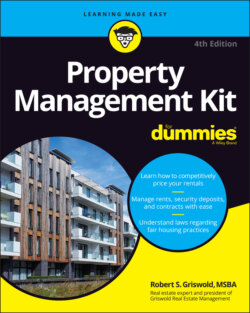Читать книгу Property Management Kit For Dummies - Robert S. Griswold - Страница 80
Evaluating the current rent
ОглавлениеWhen you acquire a rental property, part of your research is to establish its market rental value. This accurate calculation should play a role in your decision to buy. If a tenant’s current rent is below market value, one of your toughest decisions is how to handle rent increases. If you are in an area that has rent control, you may find that you are unable to increase the rent at all, or that you can do so only over many years until you can get close to the market value. You also need to know whether there is vacancy decontrol, which allows the landlord to raise the rent by some amount or even up to full market rent at the beginning of a new tenancy.
Consider the potential effect of making significant changes in rental rates or policies immediately after you acquire the property. Although you may have strong feelings against allowing pets on the property, for example, your tenants may already have pets. Although you legally have the right to implement your no-pet policy upon lease renewal or proper legal notice, you’re almost guaranteed to have a vacant rental units if you do so. Impose your policies over a reasonable time frame, but be sure that you’re aware of the potential financial consequences in the short run.
As the new owner, you often have higher mortgage payments and expenses (such as necessary repairs and upgrades to the property) than the last owner did. Some tenants get very upset and antagonistic about any rent increase, however, and you won’t be able to appease them. If tenants simply can’t afford an increase, work with them, and give them ample time to relocate if necessary. Other tenants welcome the improvements that accompany the purchase of their building by a new owner and will accept the rent increase.
Fortunately, most tenants expect to be treated fairly and honestly. They understand that you may have higher expenses and will reluctantly accept a rent increase as long as you meet two basic conditions:
You don’t raise the rent beyond the current market rent for a comparable rental unit in the area or beyond any legal limits. Give tenants documented information on comparable rentals in your area to show them that you’re not asking for unreasonable rent.
You’re willing to make basic repairs to the rental units. Don’t ask tenants to shell out extra cash without proving that you’re committed to maintaining and even improving the property. But tenants don’t appreciate all improvements equally. A new roof may not mean much if a unit didn’t leak, but a new boiler or water heater could mean better water pressure or more consistent hot water, which all tenants will notice.
Most tenants just want to be sure they’re receiving some of the benefits of paying higher rent. If you ask for more rent, be willing to reinvest a portion of the rent increase in the property with cost-effective improvements that conserve energy and/or increase tenant desirability.
Although you may be tempted to do so, be wary of making significant renovation or repairs to the property before the close of escrow. If the sale of the property doesn’t go through as planned, you may have spent considerable sums to upgrade the seller’s property without any recourse.
